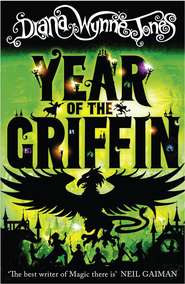По всем вопросам обращайтесь на: info@litportal.ru
(©) 2003-2024.
✖
Deep Secret
Настройки чтения
Размер шрифта
Высота строк
Поля
About the Publisher
In the year E.K. 3413, the following files were secretly obtained from the Magid Rupert Venables and, at the Emperor’s personal request, deposited in the new archive at Iforion.
(#ulink_f3e5805d-1ff4-5875-998d-7b5828a49e38)
I may as well start with some of our deep secrets because this account will not be easy to understand without them.
All over the multiverse, the sign for Infinity or Eternity is a figure eight laid on its side. This is no accident, since it exactly represents the twofold nature of the many worlds, spread as they are in the manner of a spiral nebula twisted like a Mobius strip to become endless. It is said that the number of these worlds is infinite and that more are added daily. But it is also said that the Emperor Koryfos the Great caused this multiplicity of worlds somehow by conquering from Ayewards to Naywards.
You may take your pick, depending on whether you are comfortable with worlds infinitely multiplying, or prefer to think the number stable. I have never decided.
Two facts, however, are certain: one half of this figure eight of worlds is negative magically, or Naywards, and the other half positive, or Ayewards; and the Empire of Koryfos, situated across the twist at the centre, has to this day the figure-eight sign of Infinity as its imperial insignia.
This sign appears everywhere in the Empire, even more frequently than statues of Koryfos the Great. I have reason to know this rather well. About a year ago, I was summoned to the Empire capital, Iforion, to attend a judicial enquiry. Some very old laws required that a Magid should be present – otherwise I am sure they would have done without me, and I could certainly have done without them. The Koryfonic Empire is one of my least favourite charges. It is traditionally in the care of the most junior Magid from Earth and I was at that time just that. I was tired too. I had only the day before returned from America, where I had, almost single-handed, managed to push the right people into sorting out some kind of peace in the former Yugoslavia and Northern Ireland. But all my pride and pleasure in this vanished when I saw the summons. Groaning to myself, I put on the required purple bands and cream silk brocade garments and went to take my seat in the closed court.
My first peevish, jet-lagged thought was, Why can’t they use one of the nice rooms? The Great Imperial Palace has parts that go back over a thousand years and some of those old courts and halls are wonderful. But this enquiry was in a new place, lined with rather smelly varnished wood, bleak and box-like and charmless. And the wooden benches were vilely uncomfortable. The figure-eight insignia – carved in relief and painted too bright a gold – dug into my shoulders and dazzled off the walls and off the big wooden chair provided for the Emperor. I remember irritably transferring my gaze to the inevitable statue of Koryfos the Great, looming in the corner. That was new too, and picked out in over-bright gilt, but there is this to be said for Koryfos: he had a personality. Though the statues are always the same and always idealised, you could never mistake them for anything but the likeness of a real person. He carried his head on one side, a bit like Alexander the Great of Earth, and wore a vague, cautious smile that said, “I hear what you say, but I’m going to do things my way anyway.” You could see he was as obstinate as sin.
I remember I was wondering why the Empire so loved Koryfos – he reigned for a bare twenty years over two millennia ago, and most of the time he was away conquering places, but they persist in regarding his time as the Golden Age – when we had to stand up for the entrance of the present Emperor. A very different person, small, plain and dour. You do wonder how it is that Emperors always marry the most beautiful women in several worlds and yet produce someone like Timos IX whom you would hardly notice in the street. You would glance at him and think that this was a short man with weak eyes and a chip on his shoulder. Timos IX was one of very few in the Empire who needed to wear glasses. This embarrassed me as I stood up. I was the only other person in the court in spectacles – as if I were setting up to be the Emperor’s equal. In many ways, of course, a Magid is the equal of any ruler, but in this particular court of enquiry I was a mere onlooker, there by law to certify simply whether or not the accused had broken the law as stated. I was not even supposed to speak until after a verdict had been reached.
This, among other legal facts, was tediously made known to me in the preliminaries after we all sat down and the prisoner was marched in and made to stand in the centre. He was a pleasant-looking youngster of twenty-one or so, called Timotheo. He did not look like a law-breaker. I am afraid that, apart from registering, with some perplexity, that Timotheo was an alias and that, for obscure legal reasons, his real name could not be given, I could not force my jet-lagged mind to attend very well. I remember going back to my thoughts of Koryfos the Great. He stood to the Empire in the place of a religion, it seemed to me. The wretched place had religions in plenty, over a thousand godlets and goddities, but the worship of these was a purely personal thing. As an example of how personal, I recalled that Timos IX had, about fifteen years ago, adopted the worship of a peculiarly unlovable goddess who inhabited a bush planted on the grave of a dead worshipper and who imposed on her followers a singularly joyless code of morals. This probably explained the Emperor’s pinched and gloomy look. But no one else at court had felt the need to adopt the Emperor’s faith. It was Koryfos who united everyone.
Here I was jerked to alertness. The Emperor himself read out the charges against the young man in elaborate legal language. Stripped of the law-talk it was appalling, even for the Empire. The so-called Timotheo was the Emperor’s eldest son. The decree he was said to have broken stated that no child of the Emperor, by any of his True Wives, High Ladies or Lesser Consorts, was to know who his or her parents were. The penalty for discovering who they were was death. And death for anyone who helped an Imperial child find out.
The Emperor then asked Timotheo if he had broken this decree.
Timotheo had evidently known no more of this decree than I had. He was looking as shocked and angry as I felt. I could have applauded when he answered drily, “Sire, if I hadn’t broken it before, I would have broken it when you read out my parentage just now.”
“But have you broken the decree?” the Emperor reiterated.
“Yes,” said Timotheo.
Catch-22, I thought. I was furious. What a charade!
The worst of it was that Timotheo was intelligent as well as pleasant. He would have made a much better Emperor than his father. It had obviously taken some ingenuity to find out who he was. He had been one of the four fosterlings in the house of a provincial noble and, as the enquiry proceeded, it became clear that the other three fosterlings and the noble must have given him some help. But Timotheo stuck to it that he had done the detective work and made the discovery by himself. Then he had made the bad mistake of writing to his mother, the Emperor’s First Consort, for confirmation.
“Did it not occur to you that, once you were known, my enemies might kidnap you in order to threaten me?” the Emperor asked him.
“I wasn’t going to tell anyone,” Timotheo said. “Besides, I can look after myself.”
“Then you were intending to claim the Imperial throne for yourself,” the Emperor suggested.
“No, I wasn’t,” Timotheo protested. “I just didn’t like not knowing who I am. I think I have the right to know that.”
“You have no right. You are convicted of treason to the throne out of your own mouth,” the Emperor said, satisfied. He looked at me on my high, uncomfortable bench. “The law is the law,” he said. “Bear witness, Magid, that this man broke our Imperial decree.”
I bowed. I couldn’t bear to speak to him.
After that there was a great deal of palaver, with other dignitaries getting up in their grand silks and bearing witness too. It got like a pompous dance. I sat there considering when would be the best time to spirit young Timotheo away – and I blame my jet-lagged state that I didn’t do it there and then. He was looking stunned by this time. Six men had just paraded past him, passing sentence of death on him, each swinging the white lining of their bright pink cloaks towards him. It was like being sentenced by a bed of petunias. I couldn’t take it seriously. I reckoned the best time to act was when they marched Timotheo back to his condemned cell. He had been brought in by a squad of elite guards with a mage following for added assurance, and I assumed they would think no one could touch him through all that. I bided my time.
And missed out completely. The petunias retired. The Emperor said, quite casually, “The sentence can be carried out now.” He raised a hand glittering with rings. One of them must have been one of their beam weapons, miniaturised. Timotheo gasped quietly and fell over sideways on the floor with blood running out of his mouth.
It happened so quickly that I hoped it was a trick. I could not believe that, even in the Koryfonic Empire, an Emperor would not want his eldest son alive. While I was climbing down the varnished wooden steps to the centre of the court, I was still sure it was just a deception, to make the Emperor’s enemies believe Timotheo was dead. But it was no trick. I touched Timotheo. He was still warm like a living person, but my fingers told me there was no soul there.
I left at once, from beside the corpse, to make my feelings plain.
I was thoroughly disgusted, with myself as well as the Emperor. As I made my way home, I told myself I had been stupid to expect compassion or even value for life in that place. And I had sufficient time to curse myself. Earth lies Naywards of the Empire, which makes the journey rather like going slowly uphill. I had to haul myself from lattice to lattice in the spaces between the worlds, and by the time I reached my house I not only hated the Empire, but also the stupid hampering robes it caused me to wear. I was just tearing the darn things off in my living room when the phone rang.
I wanted nothing more than to sit down with a fresh-brewed cup of coffee, before calling up the Senior Magid and lodging a formal complaint against the Emperor. I swore. I snatched up the phone.
“Now what?”
It was my elder brother Will. “Bad day?” he said.
“Very,” I said. “The Koryfonic Empire.”
“Then I believe you,” he said. “Glad I don’t have to look after that lot any longer.” Will is a Magid too. “And what I’ve got to tell you won’t make your day any better, I’m afraid. I’m ringing from Stan Churning’s house. He’s ill. He wants you here.”
“Oh God!” I said. “Why does everything unpleasant always happen at once?”
“Don’t know. It just does,” Will agreed. “It’s not a deep secret, but it ought to be. I think Stan’s dying, Rupert. He thinks so anyway. We tried to get hold of Si too, but he’s out of touch. How soon can you get here?”
“Half an hour,” I said. Stan lives outside Newmarket. Weavers End, where I live, is just beyond Cambridge.
“Good,” said Will. “Then I can stay with him until you get here.” And keep him alive if necessary, Will meant. If Stan really was dying, there would be Magid business he had to hand on to me. “See you soon,” Will said and rang off.
I stayed in the house just long enough to make coffee and fax Senior Magid that I intended to complain about the Empire, to the Upper Room if necessary. Senior Magid lives several worlds Naywards and I normally make heavy weather of getting a fax through there. That day I did it in seconds. Five angry, trenchant sentences in no time at all. I was too busy thinking of Stan. I got in my car still thinking of him. Normally, getting into my car is a thing I pause and take pleasure in – particularly if I have just been away for a while. It is a wholly beautiful car, the car I used to dream of owning as a boy. I usually pause to think how good it is that I can make the kind of money you need to own such a car. Not that day. I just got in and drove, swigging coffee from the Thermos, with my mind on Stan.
Stan had sponsored first Will, then our brother Simon, then me, into the Company of Magids. He had taught me most of what I know today. I wasn’t sure that I knew what I’d do without him. I kept praying that he, or Will, had made a mistake and that he was not dying after all. But one of the things about being a Magid is that you don’t make that kind of mistake.
“Damn!” I said. I kept needing to blink. I didn’t consciously see any of the roads I drove along until I was bumping up the weedy drive of Stan’s bungalow.
A nasty bungalow. A blot on the landscape. It looked like a large cube of Stilton cheese dumped down in the flat heathland. We used to kid Stan about how ugly it was, but he always said he was quite happy in it. People who knew me, and particularly people who knew all three of us Venables brothers when we lived in Cambridge, used to wonder what we saw in a seedy little ex-jockey like Stan. They asked how we could bring ourselves to haunt his hideous house the way we did.
The answer is that all Magids lead double lives. We have to earn a living. Stan earned his advising sheiks and other rich men about racehorses. I design computer software myself, games mostly.
I parked my car beside Will’s vehicle. At dusk, with the light behind it, it passes for a Land Rover. In broad daylight, as it was then, you look away and think you may have imagined things. I edged past it and Will opened the bottle-green front door of the bungalow to me.
“Good timing,” he said. “I have to go now and milk the goats. He’s in the front room on the left.”
“Is he—?” I said.
“Yes,” said Will. “I’ve said goodbye. Shame Si can’t be found. He’s somewhere yonks Ayewards and not in touch with anyone I can contact. Stan’s written him a letter. Let me know how things go, won’t you?” He went soberly past me and climbed into his queer vehicle.
I went on into the bungalow. Stan was lying, all five foot of him, stretched on top of a narrow bed by the window. His slightly bandy legs were in child-sized jeans and one of his socks had a thin place at the toe. At first sight, you would not have thought there was too much wrong with him, except that it was unlike him not to be wandering about doing something. But if you looked at his face, as I did almost straight away, you saw that it was strangely stretched over its bones, and that his eyes, under the high forehead left by his curly grey receding hair, were standing out like a cat’s, luminous and feverish.
“What kept you, Rupert?” he joked, a bit gaspily. “Will phoned you a good five minutes ago.”
“The Koryfonic Empire,” I said. “I had to send a complaint to Senior Magid.”











